Boven Digoel Regency
Boven Digoel Regency is one of the regencies (kabupaten) in the southern part of Papua Province in Indonesia. It is split off from Merauke Regency (of which it used to be a part) on 12 November 2002. The regency covers an area of 27,108 km2, and the total population was 55,784 at the 2010 Census;[2] the latest official estimate (as at January 2014) is 68,641. The administrative centre is the town of Tanahmerah.
Boven Digoel Regency Kabupaten Boven Digoel | |
|---|---|
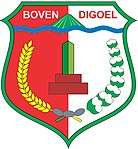 Seal | |
| Motto(s): Nup Bagen Ngup Bagenep (I Am Because You Are) | |
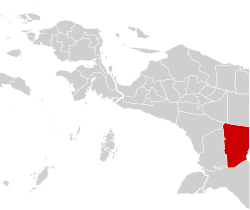 | |
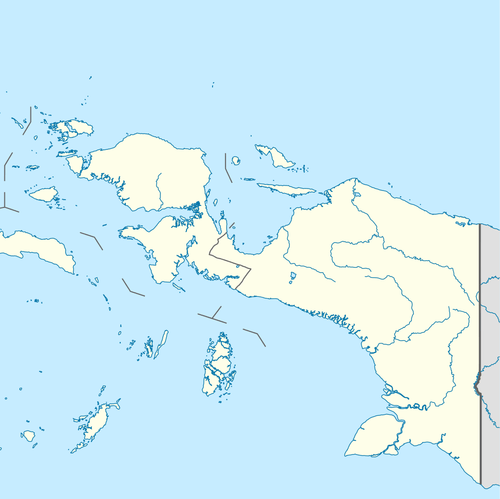 Boven Digoel Regency Location in Western New Guinea and Indonesia 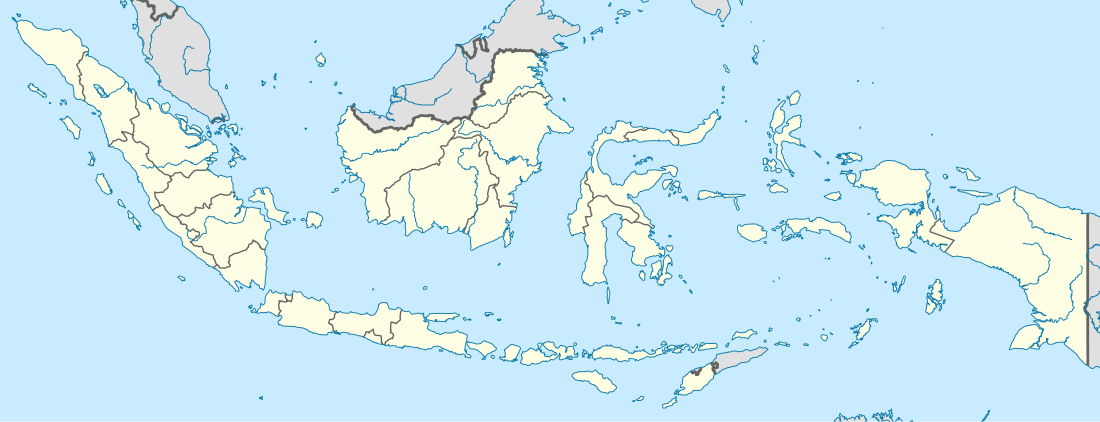 Boven Digoel Regency Boven Digoel Regency (Indonesia) | |
| Coordinates: 5.7400°S 140.3482°E | |
| Country | |
| Province | |
| Capital | Tanahmerah |
| Government | |
| • Regent | Vacant |
| • Vice Regent | Chaerul Anwar |
| Area | |
| • Total | 27,108 km2 (10,466 sq mi) |
| Population (2014)[1] | |
| • Total | 68,641 |
| • Density | 2.5/km2 (6.6/sq mi) |
| Time zone | UTC+9 (Indonesia Eastern Time) |
| Area code | (+62) 975 |
| Website | bovendigoelkab.go.id |
Administrative districts
The regency comprises twenty districts (kecamatan), tabulated below with their populations at the 2010 Census:[3]
| District | Population 2010 Census |
|---|---|
| Jair | 17,482 |
| Subur | 1,224 |
| Kia | 1,701 |
| Mindiptana | 3,622 |
| Iniyandit | 833 |
| Kombut | 691 |
| Sesnuk | 2,102 |
| Mandobo | 12,840 |
| Fofi | 1,987 |
| Arimop | 1,270 |
| Kouh | 1,186 |
| Bomakia | 2,196 |
| Firiwage | 1,088 |
| Manggelum | 1,188 |
| Yaniruma | 866 |
| Kawagit | 1,001 |
| Kombay | 1,263 |
| Waropko | 1,910 |
| Ambatkwi | 743 |
| Ninati | 591 |
| Totals | 55,784 |
History
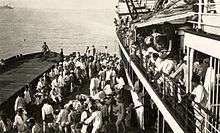
In the Dutch East Indies era, Boven Digoel Regency was known as Digul Atas (Upper Digul), located on the banks of the Digul River.
Boven-Digoel was a Dutch prison camp in the Dutch East Indies at the headwaters of the Digul River, where Indonesian nationalists and communists were interned between 1928 and 1942. Initially set to accommodate prisoners of the 1926 revolt led by the Communist Party of Indonesia, Boven-Digoel later was used as an exile for the national movement figures with a recorded number of prisoners of 1,308 people. Among the figures who had been exiled there were Mohammad Hatta, Sutan Syahrir, Sayuti Melik, and Marco Kartodikromo.
When the Pacific War broke out and Japan occupied Indonesia, Boven-Digoel prisoner was evacuated by the Dutch to Australia. The transfer was based on concerns that the prisoners would rebel if they remained at Boven-Digoel. It was hoped that the Indonesians brought to Australia would help the Dutch. It turned out that this political prisoner influenced the Australian trade union to boycott the Dutch ships that landed on the country. After the Allies succeeded in winning, the prisoners were returned to their original places in Indonesia.
References
- Statistik Boven Digoel Archived July 21, 2011, at the Wayback Machine, (in Indonesian) retrieved 10 May 2010
- Biro Pusat Statistik, Jakarta, 2011.
- Biro Pusat Statistik, Jakarta, 2011.